- CMS: Medicare Program; Implementation of Prior Authorization for Select Services for the Wasteful and Inappropriate Services Reduction (WISeR) Model
- Public Inspection: CMS: Medicare Program: Implementation of Prior Authorization for Select Services for the Wasteful and Inappropriate Services Reduction Model
- CMS: Secretarial Comments on the CBE's (Battelle Memorial Institute) 2024 Activities: Report to Congress and the Secretary of the Department of Health and Human Services
- HHS: Patient Protection and Affordable Care Act: Marketplace Integrity and Affordability
- HRSA Announces Action to Lower Out-of-Pocket Costs for Life-Saving Medications at Health Centers Nationwide
- Public Inspection: HHS: Patient Protection and Affordable Care Act: Marketplace Integrity and Affordability
- Increased Risk of Cyber Threats Against Healthcare and Public Health Sector
- Eight Hospitals Selected for First Cohort of Rural Hospital Stabilization Program
- Announcing the 2030 Census Disclosure Avoidance Research Program
- CMS: Medicare Program; Hospital Inpatient Prospective Payment Systems for Acute Care Hospitals and the Long-Term Care Hospital Prospective Payment System and Policy Changes and Fiscal Year 2026 Rates; Requirements for Quality Programs; and Other Policy Changes; Correction
- CMS: Medicare Program; Hospital Inpatient Prospective Payment Systems for Acute Care Hospitals and the Long-Term Care Hospital Prospective Payment System and Policy Changes and Fiscal Year 2026 Rates; Requirements for Quality Programs; and Other Policy Changes; Correction
- CMS: Medicare and Medicaid Programs; Contract Year 2026 Policy and Technical Changes to the Medicare Advantage Program, Medicare Prescription Drug Benefit Program, Medicare Cost Plan Program, and Programs of All-Inclusive Care for the Elderly; Correction
- CMS: Medicare and Medicaid Programs; Contract Year 2026 Policy and Technical Changes to the Medicare Advantage Program, Medicare Prescription Drug Benefit Program, Medicare Cost Plan Program, and Programs of All-Inclusive Care for the Elderly; Correction
- CMS: Medicare Program; Prospective Payment System and Consolidated Billing for Skilled Nursing Facilities; Updates to the Quality Reporting Program for Federal Fiscal Year 2026
- CMS: Medicare Program; FY 2026 Hospice Wage Index and Payment Rate Update and Hospice Quality Reporting Program Requirements
The CDC Lacks a Rural Focus. Researchers Hope a Newly Funded Office Will Help.

In 2017, the Centers for Disease Control and Prevention published multiple reports analyzing health disparities between rural and urban populations.
That effort pleased researchers and advocates for improving rural health because the dozen or so examinations of rural health data provided important details about the 46 million Americans who live away from the nation’s population centers. It began to fill a gap in the information used by those who study and address the issues that affect people in rural communities.
But those reports, the Morbidity and Mortality Weekly Report rural health series, began and ended in 2017. And though the CDC has addressed rural health in other weekly reports and data briefs, the agency hasn’t examined it in such depth since.
That’s one reason rural health advocates successfully pushed for the CDC to extend its rural health focus by creating an Office of Rural Health at the agency. The office is operational as of March 2023, and advocates hope the agency will commit to rural health research and provide analyses that lead to good public health policies for rural communities.
“What we’re seeing is rural continually getting left behind,” said Alan Morgan, CEO of the National Rural Health Association, which urged Congress to fund the office. “They’re communities at risk, communities that may not be employing public health safety measures, and we are flying blind,” he said.
“What’s needed is an ongoing look at rural communities, their populations, to better direct both state and federal efforts to address health disparities,” he said.
Appalachian Regional Commission Announces SUD Recovery Ecosystem Grant Funding

On January 17, 2023 the Appalachian Regional Commission (ARC), a federal-state partnership working to strengthen economic growth and community development in 13 Appalachian states, issued a Request for Proposals (RFP) for its Investments Supporting Partnerships in Recovery Ecosystems (INSPIRE) initiative. The grant program addresses the region’s substance use disorder (SUD) crisis with investments up to $13 million in the creation and expansion of a SUD recovery ecosystem that helps facilitate workforce entry and re-entry.
Awards issued through the INSPIRE Initiative will support a wide variety of projects on the post-treatment to employment continuum, including investments in healthcare networks to better meet the needs of SUD recovery professionals, recovery-focused job and workforce training programs, expanded recovery support networks, training and certification of recovery specialists, and more. Successful INSPIRE grant applications will demonstrate the potential for individuals in recovery to obtain and maintain stable employment, with a focus on contributing to and expanding a strong recovery ecosystem of support services and training opportunities that lead to successful entry and re-entry into the workforce. Proposals may also include expanded community- and partnership-based approaches to establish stronger coordination among recovery and training services, as well as strategies to integrate plans with existing state and regional economic development activities. Letters of Intent (LOI) for implementation grants up to $500,000 and planning grants up to $50,000 under INSPIRE are due February 21, 2023. The deadline for final applications is March 17, 2023. Award announcements are anticipated to be made in September 2023.
For more information on this initiative and how to apply, please visit: https://www.arc.gov/inspire-initiative-application-information/
Throughout the month of February, ARC will be hosting several events focusing on the INSPIRE Initiative for communities to learn more about the program. Mark your calendars now to join us on the following dates:
- February 15 at 10:00 a.m. EST (Virtual Pre-Application Workshop)
- February 23 (In-Person Pre-Application Workshop)*
- February 28 (In-Person Pre-Application Workshop)*
- March 2 at 9:00am EST (Virtual Grant Writing Workshop)
*More information on the in-person application workshops will be forthcoming. Please visit ARC’s website for workshop updates.
SUN Smiles Program Receives Rural Health Program of the Year Award
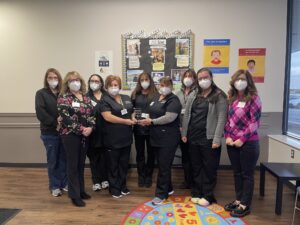 Family Health Council of Central Pennsylvania (FHCCP) and the organization’s Women, Infant, and Children (WIC) Tapestry of Health SUN Smiles program received the Rural Health Program of the Year award, presented by the Pennsylvania Office of Rural Health (PORH). The award was presented by Lisa Davis, director and outreach associate professor of health policy and administration at Penn State, on Nov. 17 at a ceremony at the WIC Tapestry of Health clinic in Shamokin Dam, PA.
Family Health Council of Central Pennsylvania (FHCCP) and the organization’s Women, Infant, and Children (WIC) Tapestry of Health SUN Smiles program received the Rural Health Program of the Year award, presented by the Pennsylvania Office of Rural Health (PORH). The award was presented by Lisa Davis, director and outreach associate professor of health policy and administration at Penn State, on Nov. 17 at a ceremony at the WIC Tapestry of Health clinic in Shamokin Dam, PA.
The Rural Health Program of the Year Award recognizes an exemplary health program that addresses an identified need in a rural community utilizing unique, creative, and innovative approaches to do so.
The award was presented during 2022 Rural Health Week in Pennsylvania, Nov. 14-18. The week encompasses Nov. 17, which is National Rural Health Day, established in 2011 by the National Organization of the State Offices of Rural Health. Both events celebrate “The Power of Rural” by honoring rural American residents, health care providers, and communities.
The nomination, submitted by Karen McCraw, vice president of advocacy and development at Family Health Council of Central Pennsylvania (FHCCP) in Camp Hill, PA, lauded SUN Smiles for developing a comprehensive program that formed partnerships between FHCCP, Central Susquehanna Opportunities, Snyder-Union Community Action Agency, and the Susquehanna River Valley Dental Health Clinic. The program was created to improve oral health outcomes for economically marginalized clients of the Special Supplemental Nutrition Program for WIC clients in Snyder, Union, and Northumberland counties.
The goals of SUN Smiles are to reduce the proportion of adults and children with untreated tooth decay; increase the proportion of children, adolescents, and adults who use the oral health care system; increase the proportion of people with dental insurance; and reduce the proportion of persons who are unable to obtain or delay obtaining necessary dental care. The program also aims to reduce the proportion of children ages one to five who report dental problems, reduce oral health disparities among low-income rural clients, and give every adult and child in WIC the chance to have a healthy smile. All pregnant and postpartum women and children who are clients of WIC are routinely screened for dental needs and referred to Community Health Workers (CHW), as needed, for assistance with Medicaid enrollment, appointment scheduling, transportation, payment for services, and more.
In the first 11 months of the program, SUN Smiles screened 2,028 WIC clients and referred 700 clients to CHWs and 400 clients to dental care; 154 program clients received dental services at FHCCP’s partner dental provider site. In addition to care navigation, oral health education and fluoride varnish days at WIC offices are key elements of the program.
PORH was formed in 1991 as a joint partnership between the federal government, the Commonwealth of Pennsylvania, and Penn State. The office is one of 50 state offices of rural health in the nation and is charged with being a source of coordination, technical assistance, networking, and partnership development.
PORH provides expertise in the areas of rural health, population health, quality improvement, oral health, and agricultural health and safety. PORH is administratively located in the Department of Health Policy and Administration in the College of Health and Human Development at Penn State University Park.
Each year, PORH presents awards to recognize rural health programs and individuals who have made substantial contributions to rural health in Pennsylvania. To learn more about the Pennsylvania Office of Rural Health, visit porh.psu.edu.
East Lycoming Ambulance Association Receives Rural Health Program of the Year Award
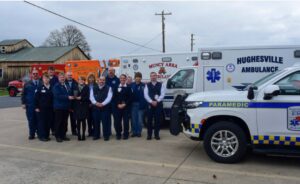 The East Lycoming Ambulance Association (ELAA), Hughesville, PA, received the Rural Health Program of the Year award, presented by the Pennsylvania Office of Rural Health (PORH). The award was presented by Lisa Davis, director of PORH and outreach associate professor of health policy and administration at Penn State, on Nov. 17 at the ELAA headquarters in Hughesville.
The East Lycoming Ambulance Association (ELAA), Hughesville, PA, received the Rural Health Program of the Year award, presented by the Pennsylvania Office of Rural Health (PORH). The award was presented by Lisa Davis, director of PORH and outreach associate professor of health policy and administration at Penn State, on Nov. 17 at the ELAA headquarters in Hughesville.
The Rural Health Program of the Year Award recognizes an exemplary health program that addresses an identified need in a rural community by utilizing unique, creative, and innovative approaches to do so.
The award was presented during 2022 Rural Health Week in Pennsylvania, Nov. 14-18. The week encompasses Nov. 17, which is National Rural Health Day, established in 2011 by the National Organization of the State Offices of Rural Health. Both events celebrate “The Power of Rural” by honoring rural American residents, health care providers, and communities.
The nomination, submitted by Joshua Dorman, ambulance captain at the Hughesville Volunteer Fire Department, Hughesville, PA, recognized the 20-year cooperative effort between four volunteer fire departments, Hughesville Volunteer Fire Company, Muncy Area Volunteer Fire Company, Picture Rocks Volunteer Fire Company, and Muncy Township Volunteer Fire Company. The association is completely self-funded by these fire companies which underwrite Emergency Medical Technicians (EMT) wages and provide the necessary equipment and facility to provide emergency services in rural Pennsylvania.
The fire companies staff a Basic Life Support ambulance seven days a week which is responsible for covering 911 emergency medical calls and vehicle accidents for 10 municipalities in rural Pennsylvania. Throughout the COVID-19 pandemic, this collaboration has been critical for the area due to the significant increase in emergency calls. Without these companies providing these essential services, many of those calls would go unanswered.
PORH was formed in 1991 as a joint partnership between the federal government, the Commonwealth of Pennsylvania, and Penn State. The office is one of 50 s
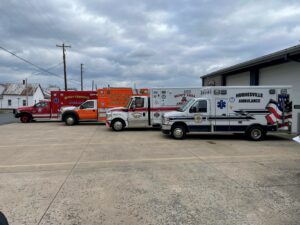
tate offices of rural health in the nation and is charged with being a source of coordination, technical assistance, networking, and partnership development.
PORH provides expertise in the areas of rural health, population health, quality improvement, oral health, and agricultural health and safety. PORH is administratively located in the Department of Health Policy and Administration in the College of Health and Human Development at Penn State University Park.
Each year, PORH presents awards to recognize rural health programs and individuals who have made substantial contributions to rural health in Pennsylvania. To learn more about the Pennsylvania Office of Rural Health, visit porh.psu.edu.
Pennsylvania Senator Elder Vogel, Jr. Receives Rural Health Legislator of the Year Award

Pennsylvania Senator Elder Vogel, Jr. received the Rural Health Legislator of the Year Award, presented by the Pennsylvania Office of Rural Health (PORH). The award was presented by Lisa Davis, director of PORH and outreach associate professor of health policy and administration at Penn State, during a ceremony on Nov. 15, 2022, at the Main Capitol Building in Harrisburg, PA.
The Rural Health Legislator of the Year Award recognizes an outstanding legislator from Pennsylvania for their work and support of rural health initiatives that address an identified need in their district or across the state.
The award was presented during 2022 Rural Health Week in Pennsylvania, Nov. 14-18. The week encompasses Nov. 17, which is National Rural Health Day, established in 2011 by the National Organization of the State Offices of Rural Health. Both events celebrate “The Power of Rural” by honoring rural American residents, health care providers, and communities.
The nomination, submitted by Pennsylvania Secretary of Agriculture Russell Redding, recognized Vogel for recognizing and addressing the mental health needs of the agricultural community and bringing statewide and community attention to this important issue. As a fourth-generation farmer, Vogel is abundantly aware of the significance of this issue and the missed cries for help. He continues to discuss, share helpful resources, and advocate for the farming community. Vogel also is a compelling advocate of telemedicine for agricultural and rural communities. He sponsored legislation that has defined telemedicine and provided opportunities for rural areas to receive specialized care, including mental health services, without traveling outside the community.
PORH was formed in 1991 as a joint partnership between the federal government, the Commonwealth of Pennsylvania, and Penn State. The office is one of 50 state offices of rural health in the nation and is charged with being a source of coordination, technical assistance, networking, and partnership development.
PORH provides expertise in the areas of rural health, population health, quality improvement, oral health, and agricultural health and safety. PORH is administratively located in the Department of Health Policy and Administration in the College of Health and Human Development at Penn State University Park.
Each year, PORH presents awards to recognize rural health programs and individuals who have made substantial contributions to rural health in Pennsylvania. To learn more about the Pennsylvania Office of Rural Health, visit porh.psu.edu.
Amanda Vaglia, D.O. Recognized as 2022 Rural Health Community Star
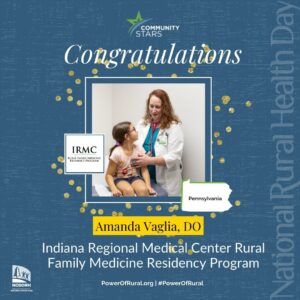
Amanda Vaglia, D.O, Primary Care Physician and Program Director at Indiana Regional Medical Center’s Rural Family Medicine Residency Program, Indiana Regional Medical Center, Indiana. PA, is Pennsylvania’s 2022 Community Star, designate by the National Organization of State Offices of Rural Health (NOSORH). NOSPRH, the member association for each of the 50 State Offices of Rural Health, leads National Rural Health Day. The Pennsylvania Office or Rural Health, University Park, PA, collaborates with NOSORH to recognize those who serve the vital needs of the estimated 57 million people living in rural America.
The nomination, submitted by Lisa Davis, MHA, Director and Outreach Associate Professor of Health Policy and Administration, Pennsylvania Office of Rural Health, University Park, PA, lauded Vaglia’s advocacy for developing the Rural Physician Residency Program at Indiana Regional Medical Center (IRMC), to ensure access to high quality health care and to training the next cohort of talented rural primary physicians. Davis notes, “Dr. Vaglia has deep roots in rural Pennsylvania and has spent her academic and professional career on providing high quality primary care to generations of families, from birth to geriatrics.”
Dr. Vaglia has been a true rural health community champion and star. She has recognized the need to recruit and retain physicians in her community, cultivate rural leadership and practice in medical residents, and address rural population health. Dr. Vaglia is focused on education, collaboration, and communication that led the efforts to fulfill the vision of establishing a family medicine residency program at IRMC, which serves as the rural sole community hospital in the county. The Rural Residency Program has at its core, the mission of providing excellent, comprehensive, family medicine training so that graduates might fill health care disparities in rural Pennsylvania communities.
Dr. Vaglia also serves on statewide Pennsylvania Rural Physician Pathway Planning Committee, a collaboration between the Area Health Education Center program, rural clinical training programs across the state, the Pennsylvania Primary Care Career Center, the Pennsylvania Academy of Family Physicians, and the Pennsylvania Office of Rural Health, to envision an innovative clinical pipeline for recruitment, training, and retention in rural communities.
The National Organization of State Offices of Rural Health’s (NOSORH) annual Community Star recognition program is one of the most popular features of National Rural Health Day. Each person, coalition, and organization nominated to be their state’s Community Star represents the faces and grassroots initiatives that are working to address the social determinants of health and improve the lives of those who call rural their home. The 2022 Community Stars book can be accessed at www.powerofrural.org.
Gov. Tom Wolf Proclaims November 14-18, 2022 Rural Health Week in Pennsylvania
In an effort to draw attention to the wide range of issues that impact rural health, Gov. Tom Wolf has declared Nov. 14-18, 2022, as Rural Health in Pennsylvania week at the request of the Pennsylvania Rural Health Association (PRHA) and the Pennsylvania Office of Rural Health (PORH).
Gov. Wolf made the proclamation to promote awareness of the full range of issues that impact rural health care throughout the Commonwealth and the health status of rural Pennsylvanians. Nationally, Pennsylvania ranks as one of the states with the highest number of rural residents, with 26 percent of Pennsylvanians residing in rural areas. In recognition of Pennsylvania’s diverse rural needs, the Commonwealth has supported the development of the Center for Rural Pennsylvania, the Pennsylvania Office of Rural Health, and other agencies and initiatives to address the needs of rural Pennsylvanians.
The week encompasses Nov. 17, which is National Rural Health Day, established in 2011 by the National Organization of State Offices of Rural Health (NOSORH) to showcase rural America; increase awareness of rural health issues; and promote the efforts of NOSORH, State Offices of Rural Health (SORHs) and others in addressing those issues.
“Nearly 59.5 million Americans, including 3.4 million Pennsylvanians, live in rural communities,” said Lisa Davis, PORH director and outreach associate professor of health policy and administration at Penn State. “These small towns and communities continue to be fueled by the creative energy of citizens who step forward to provide a wealth of products, resources, and services.
Rural communities also face unique health care concerns: a lack of providers; accessibility issues, particularly in terms of transportation and technology; and affordability issues as the result of larger percentages of uninsured and underinsured citizens and greater out-of-pocket health costs. Rural hospitals and health care providers, which frequently are the economic backbone of the communities they serve, deserve special consideration so that they can continue to provide high-quality services and meet the needs of rural residents.”
To celebrate the work being done to achieve health care access and equity in Pennsylvania, PORH will present Pennsylvania Rural Health Awards during in communities across Pennsylvania.
PORH was established in 1991 to enhance the health status of rural Pennsylvanians and strengthen the delivery and quality of care in the communities in which they live. Each year, the organization presents awards to recognize rural health programs and individuals who have made substantial contributions to rural health in Pennsylvania. To learn more about the Pennsylvania Office of Rural Health, visit porh.psu.edu.
PRHA is dedicated to enhancing the health and well-being of Pennsylvania’s rural citizens and communities. Through the combined efforts of individuals, organizations, professionals, and community leaders, the Association is a collective voice for rural health issues and a conduit for information and resources. More information can be found at paruralhealth.org.
Webinar Explores Strategies for Cultivating a Rural Health Workforce
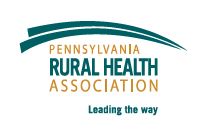 On September 6, 2022, the Pennsylvania Rural Health Association held a webinar on training, recruiting, and retaining a strong rural health workforce in Pennsylvania, as part of its Special Topics in Rural Health 2022 Webinar Series hosted by Rep. Kathy Rapp (R-PA 65th District) and Sen. Michele Brooks (R-PA 50th District). Ben Fredrick, MD, Professor of Family & Community Medicine at the Penn State College of Medicine and Program Director of the Pennsylvania Area Health Education Center (PA AHEC), gave a compelling presentation on strategies for cultivating rural health professionals in our hometowns.
On September 6, 2022, the Pennsylvania Rural Health Association held a webinar on training, recruiting, and retaining a strong rural health workforce in Pennsylvania, as part of its Special Topics in Rural Health 2022 Webinar Series hosted by Rep. Kathy Rapp (R-PA 65th District) and Sen. Michele Brooks (R-PA 50th District). Ben Fredrick, MD, Professor of Family & Community Medicine at the Penn State College of Medicine and Program Director of the Pennsylvania Area Health Education Center (PA AHEC), gave a compelling presentation on strategies for cultivating rural health professionals in our hometowns.
See below for the links to the presentation, recording, and handout.
Presentation: Cultivating A Rural Health Workforce in Pennsylvania
Recording: Cultivating a Rural Health Workforce in Pennsylvania
New CMS Rule Increases Payments for Acute Care Hospitals & Advances Health Equity, Maternal Health

CMS issued a final rule for inpatient and long-term care hospitals that builds on the Biden-Harris Administration’s key priorities to advance health equity and improve maternal health outcomes. As required by statute, the fiscal year (FY) 2023 Inpatient Prospective Payment System (IPPS) and Long-Term Care Hospital (LTCH) Prospective Payment System (PPS) rule updates Medicare payments and policies for hospitals, drives high-quality, person-centered care, and promotes fiscal stewardship of the Medicare program. In addition, the rule finalizes new measures to encourage hospitals to build health equity into their core functions. These actions will improve care for people and communities who are disadvantaged or underserved by the health care system.
The rule includes three health equity-focused measures in hospital quality programs and establishes a “Birthing-Friendly” hospital designation. CMS will award this new designation to hospitals that participate in a statewide or national perinatal quality improvement collaborative program and have implemented the recommended quality interventions.
For acute care hospitals paid under the IPPS that successfully participate in the Hospital Inpatient Quality Reporting (IQR) Program and are meaningful electronic health record users, the final rule will result in an increase in operating payment rates of 4.3%. This reflects a FY 2023 projected hospital market basket update of 4.1%, reduced by a statutorily required productivity adjustment of a 0.3 percentage point and plus a 0.5 percentage point adjustment required by statute. This is the highest market basket update in the last 25 years and is primarily due to higher expected growth in compensation prices for hospital workers. Under the LTCH PPS, CMS expects payments in FY 2023 to increase by approximately 2.4% or $71 million.
“CMS is taking action to support hospitals, including updating payments to hospitals by a significantly higher rate than in the proposed IPPS rule. This final rule aligns hospital payments with CMS’ vision of ensuring access to health care for all people with Medicare and maintaining incentives for our hospital partners to operate efficiently,” said CMS Administrator Chiquita Brooks-LaSure. “It also takes important steps to advance health equity by encouraging hospitals to implement practices that reduce maternal morbidity and mortality.”
Advancing Health Equity:
Consistent with the agency’s definition of health equity, CMS is working to advance health equity by designing, implementing, and operationalizing policies and programs that support health for all the people served by our programs, eliminating avoidable differences in health outcomes experienced by people who are disadvantaged or underserved, and providing the care and support that our enrollees need to thrive.
To address health care disparities in hospital inpatient care and beyond, CMS is adopting three health equity-focused measures in the IQR Program. The first measure assesses a hospital’s commitment to establishing a culture of equity and delivering more equitable health care by capturing concrete activities across five key domains, including strategic planning, data collection, data analysis, quality improvement, and leadership engagement. The second and third measures capture screening and identification of patient-level, health-related social needs — such as food insecurity, housing instability, transportation needs, utility difficulties, and interpersonal safety. By screening for and identifying such unmet needs, hospitals will be in a better position to serve patients holistically by addressing and monitoring what are often key contributors to poor physical and mental health outcomes.
In the near future, CMS is also interested in using measures focused on connecting patients with identified social needs to community resources or services. CMS sought comment on the proposed rule. In the final rule, CMS acknowledges the robust comments received on key considerations that inform our approach to improving data collection, to better measure and analyze disparities across programs and policies, and approaches for updating the Hospital Readmissions Reduction Program (HRRP) that encourage providers to improve performance for socially at-risk populations.
CMS is also discontinuing the use of proxy data for uncompensated care costs in determining uncompensated care payments for Indian Health Service and Tribal hospitals, and hospitals in Puerto Rico, and we are establishing a new supplemental payment to prevent undue long-term financial disruption for these hospitals and to promote long-term payment stability. CMS is also finalizing new flexibilities for graduate medical education for rural hospitals participating in rural track programs, which will help promote workforce development in rural areas.
Improving Maternal Health Outcomes:
CMS is creating a new hospital designation to identify “Birthing-Friendly” hospitals and additional quality measure reporting to drive improvements in maternal health outcomes. CMS is finalizing this designation following the release of the comprehensive CMS Maternity Care Action Plan.
The Biden-Harris Administration has championed policies to improve maternal health and equity since taking office. Earlier this year, Vice President Harris convened a first-ever White House meeting with Cabinet Secretaries and agency leaders, including Secretary Becerra and CMS Administrator Chiquita Brooks-LaSure, to discuss the Administration’s whole-of-government approach to reducing maternal mortality and morbidity. In December 2021, Vice President Harris announced a historic call to action to improve health outcomes for parents and their young children in the United States. Implementing this new hospital designation is part of the Biden-Harris Administration’s continued response to that call to action, as noted in the CMS Maternity Care Action Plan.
The “Birthing-Friendly” hospital designation will provide important information to consumers about hospitals with a demonstrated commitment to reducing maternal morbidity and mortality by implementing best practices that advance health care quality and safety for pregnant and postpartum patients.
Conditions of Participation Pandemic Reporting for Hospital and Critical Access Hospitals (CAH):
CMS proposed to continue the current COVID-19 reporting requirements for hospitals and CAHs as well as establish new reporting requirements for future public health emergencies (PHE). Based on public feedback, CMS is finalizing the proposed requirements for continued COVID-19-related reporting for hospitals and CAHs with a reduced number of data categories as an off ramp to the current PHE. CMS is not finalizing the proposed reporting requirements for future PHEs.
Continued Public Reporting of Patient Safety Metrics:
CMS uses quality measures to ensure safety and quality within the health care system and to pay providers through value-based programs. For the FY 2023 Hospital-Acquired Condition (HAC) Reduction Program, CMS proposed to pause — meaning not calculate and subsequently not publicly report — the data for the PSI-90 measure, which is a composite measure that covers multiple patient safety indicators, such as pressure sores, falls, and sepsis. CMS’ proposal reflected concerns about the impact COVID-19 would have on the ability to interpret data and was also sensitive to the risks of financially penalizing hospitals for factors potentially out of their control. CMS recognizes the importance of this measure for patients and providers and is finalizing the calculation and public reporting of the CMS PSI-90 measure results. CMS will include the measure in Star Ratings in alignment with the feedback we received. Although this measure will be publicly reported, it will not be used in payment calculations in the HAC to avoid unintentional penalties related to the uneven impacts of COVID-19 across the country.
More Information:
- Final Rule fact sheet
- Maternal Health fact sheet
- Final Rule
FDA Youth Vaping & E-Cigarette Toolkit Released
The Food and Drug Administration (FDA) has released a free toolkit about vaping and e-cigarettes for professionals working with youth. The toolkit contains fast facts about youth vaping as well as tips for how adults can help teens quit vaping. It is available to order, download, or print through the FDA.
